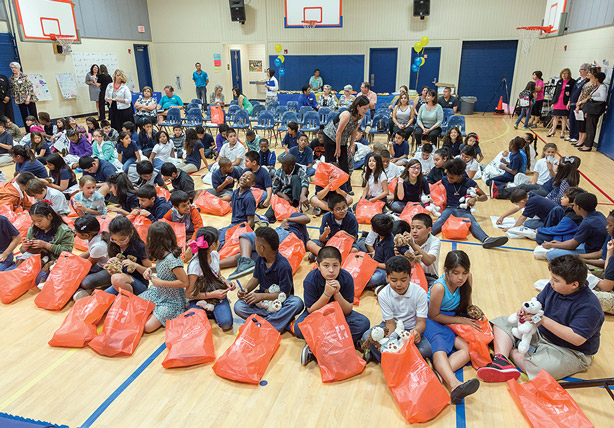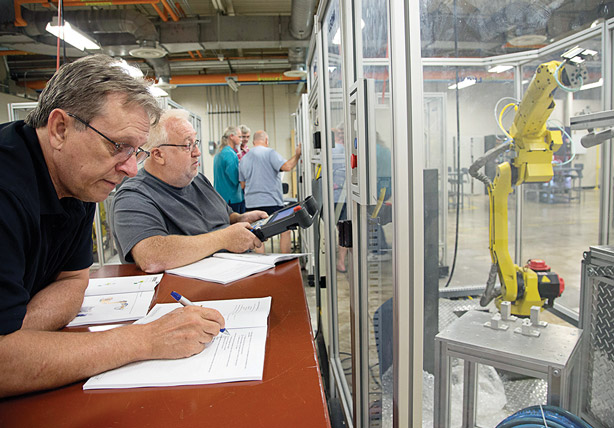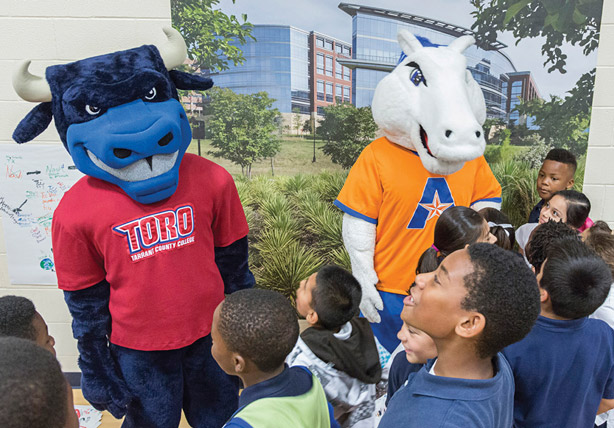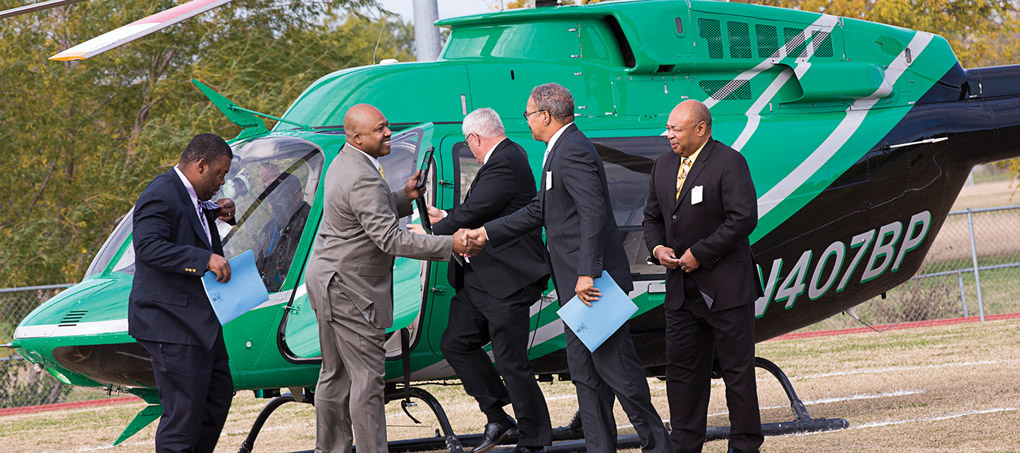There's Power in Partnerships
Collaborating to Accelerate Student Success
By Rita L. B. Parson
People nationwide endure long commutes and hours at work to cover life’s basic expenses. And for many, it’s not enough… especially when catastrophe strikes. Their only option is to turn to public assistance.
Yet, state and federal governments already are strained, creating challenges for local communities to stay economically viable. In response, the search for creative ways to help families become and stay self-sufficient is accelerating because data reflects that a community’s economic viability is intricately tied to the well-being of its residents.
Throughout the country, individuals and organizations are seeking solutions, including the highest office in the nation. President Barack Obama and others believe community colleges can spur economic recovery by serving as a bridge between unskilled workers and a job market demanding a highly skilled labor force. In his State of the Union address this year, the President said he has tapped Vice President Joe Biden to lead the charge and help transform job training to bridge this critical gap.
"They have one mission: train Americans with the skills employers need, and match them to good jobs that need to be filled right now. It means connecting companies to community colleges that can help design training to fill their specific needs," President Obama said. "We’re working to redesign high schools and partner them with colleges and employers that offer the real-world education and hands-on training that can lead directly to a job and career."
Working with ISDs
Long before the President sounded the alarm, Tarrant County College had consistently answered the call to help citizens acquire the skills needed to fill available jobs. TCC’s long-term relationship with the Fort Worth Independent School District represents just one example. FWISD and TCC announced a collaborative effort to provide advanced aviation and engineering training for students at Dunbar High School. Representatives from Bell Helicopter, FWISD and TCC landed in a Bell 407GX (pictured above) at Dunbar High School to introduce the program to students and members of the community.
The aviation and engineering program is expanding this fall with newly created curricula that includes expertise from industry partner Bell Helicopter. The changes will start for the ninth-grade class, with other grades added as the inaugural class progresses.
Students who complete the rigorous program can earn industry certification and dual credit. This program, one of the District’s Gold Seal Programs of Choice, will allow students to complete their training in 18 to 24 months. It includes a senior-year project that will help determine if the student will be recruited by Bell Helicopter or other companies in the aviation industry once they are finished.
"The big advantage for students is that at the end of the day, these students who now are in high school, in places like Dunbar, have skills that companies, like the Bells and Lockheeds of the world, need as their workforce," said Clint Grant, divisional dean for TCC’s Northwest Campus Business Technology and Transportation.
Working with Community Organizations
Other TCC partners recognize the merits of high school students learning skills to prepare them for existing jobs in the market place.
"I have felt forever that students ought to be prepared for a meaningful and financially viable life," said Cynthia Fisher Miller, senior director for education at the Fort Worth Chamber of Commerce. She said studies increasingly show that more than 50 percent of available jobs require some post-secondary education. "Everyone benefits from an employment perspective."

Trinity River Campus embraced Charles E. Nash Elementary School as part of its commitment to service and community engagement.
Miller works closely with TCC representatives on the Chamber’s Quality Workforce Committee. The partnership not only helps the Chamber to educate local businesses about the hands-on training that TCC can provide to help them enhance their employees’ skills, but also assures companies evaluating Fort Worth as a new home that Tarrant County has skilled laborers needed to run their businesses.
Community partnerships with organizations such as the Community Learning Center (CLC) as headed by Angela Traiforos, the United Way of Tarrant County and the Women’s Center of Tarrant County allow TCC to take training to people wherever they are located.
Traiforos has trained people of all ages. She first sought TCC’s assistance for training about 25 years ago when Fort Worth was selected to receive a U.S. Department of Labor grant to train older workers to fill manufacturing jobs. "We have continued to work with the College. The partnership has become stronger and better from all kinds of programs ranging from the dislocated, unemployed, youth, at-risk youth and ex-offenders," Traiforos said. “TCC provided the resources that we didn’t have available — teachers, computer labs, software and instructors."
Sue Matkin, vice president for Community Development at the United Way of Tarrant County, lauded her organization’s partnership with TCC.
"We have been partnering with the Financial Stability Initiative for over six years and Adult Literacy for over eight years," Matkin said. "TCC brings expertise and dedicated staff to the relationship and has been instrumental in helping United Way achieve our outcomes."
Working with Local Businesses
Opportunities to work with more companies keep growing as news continues to spread of TCC’s ability to efficiently provide effective training. One of TCC’s latest partners, Alexander’s Machine, was one of four companies that received a Skills Development Fund Manufacturing Consortium grant totaling nearly $890,000. The company elected to work with TCC after seeing the same equipment their company uses during a campus tour. "Having access to this grant will give Alexander’s Machine the opportunity to train our current employees with a much-needed skill," said owner Ron Alexander. TCC’s expertise in the use of this equipment made it the clear choice to provide on-site training to Alexander’s employees. "In the past we have tried to train new hires. That has not worked for us because our shop is so unique. Being able to partner with TCC to train our current employees is going to enable us to train our employees in our shop environment."
 TCC collaborates with community organizations and local companies to provide effective
training.
TCC collaborates with community organizations and local companies to provide effective
training.
Since 2008, TCC has received grants totaling more than $9.5 million to work with approximately 30 organizations to train more than 11,300 workers.
Whether it’s with industry or community groups, TCC’s success at playing a key role helping prepare the workforce is expected to continue thanks to the willingness of partners such as Tom Knight, technical training manager at Bell Helicopter.
"The known capabilities of the Tarrant County College support staff and highly skilled professional trainers solidified our relationship and defined our joining in this partnership to further support and advance our community youth," Knight said. "The major benefits for Bell being involved in the development of this partnership are knowing the skills and capacities of the students when they graduate."
And, as Knight told students on the day the program was announced, the final result is in their hands. "We will provide the opportunity, (but) the one to really make this happen is you."
Working with Campus Partners
Even while their children were still in elementary school, Miriam Rodriguez and her husband knew that one day they would need to attend college. They were committed – but they didn’t know how this dream would materialize.
That was before Tarrant County College opened its Trinity River Campus downtown in 2009. Not long after moving in, Campus President Tahita Fulkerson and her staff embraced Charles E. Nash Elementary School as part of the campus’s commitment to "Service and Community Engagement."
TCC partnered with the Fort Worth Independent School District and The University of Texas at Arlington to issue the Nash Academic Challenge, which was recently renewed. "When I heard the gift that TCC and UTA were going to give our children, it was just such a gift that some of us cried," Rodriguez said. Her children, Freddy and Samantha, were among the first and second group of children to take advantage of the opportunity. Freddy is taking college courses already at TCC’s Northwest Campus.
Rodriguez is excited that their children now have "a future where everything is possible (and) nothing can stop them."
TCC will provide a full-tuition scholarship plus books for each student who satisfies the conditions of the Challenge, including graduating from Nash Elementary and a Fort Worth Independent School District high school. Additionally, the recently renewed Challenge provides financial support for Pell-eligible students who go on to complete an associate degree at TCC. UTA will guarantee sufficient funding to cover the cost of tuition and mandatory fees not covered by other grants and scholarships for a period of two years.

Mascots mingle: TCC's Toro and UTA's Blaze visit with young students.
Making Collaboration an Art Form
TCC also collaborates with community leaders to invest in programs that one day will benefit not only its students, but will enhance the quality of life in neighboring communities.
When Larry Darlage became president of the Northeast Campus 18 years ago, he immediately worked to make his TCC campus an integral part of the community. "I made a special effort to become involved in the chambers of commerce in the area. Because the campus is located in two cities, Hurst and North Richland Hills, I especially became active in the HEB and Northeast Tarrant Chambers and developed close ties with the mayors of these two cities," he said.
As a result, his campus laid the groundwork so that the community one day will benefit from a Visual and Performing Arts Center that will serve as an "instructional facility for our students in the Humanities," Darlage said. The new structure would allow growth in the program that is now stymied because the current location, now shared with Health and Physical Education, is consistently booked every day and evening.
"The addition of an art gallery will provide a more professional venue for student and guest artist shows," said Darlage, who is retiring this fall. "The large performing arts theater will give our drama and music students the ability to perform for larger audiences and afford them the opportunity to participate in community Lecture and Performing Arts Series."
Other Northeast Campus partnerships have resulted in the creation of the annual Heart of North Texas Business Conference and the Haltom City Northeast Center (HCNC). Each year, business leaders collaborate on key issues facing northeast Tarrant County and support the Texas Scholars Program for all public high schools in their area. HCNC’s transformation from an old library building is making it possible for more than 1,000 students to take credit and continuing education classes without leaving their neighborhood.
Getting to know its neighbors will remain a vital part of TCC’s longstanding commitment to put success within reach for the communities it serves.

